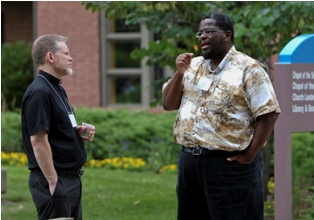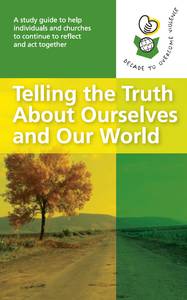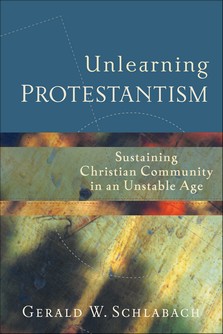Click here to read a recent commentary on Mennonite-Catholic peace witness. The reflection is written by Andre Gingerich Stoner, Director of Interchurch Relations (Mennonite Church USA) and longtime friend of Bridgefolk.
Tag: Ecumenical news
Lutherans and Mennonites seek reconciliation, forgiveness
STUTTGART, Germany– In what Bishop Mark S. Hanson, President of the Lutheran World Federation (LWF), described as possibly “the most significant legacy this Assembly will leave,” the Eleventh Assembly of the LWF today took the historic step of asking the Mennonites for forgiveness for past persecutions. Delegates unanimously approved a statement calling Lutherans to express their regret and sorrow for past wrongdoings towards Anabaptists and asking for forgiveness.
Hanson described the act of repentance and reconciliation as “communion building and communion defining. “We will not just look back; we will also look towards together to God’s promised future.” Continue reading “Lutherans and Mennonites seek reconciliation, forgiveness”
Mennonite World Conference endorses dialogue with Catholics, Lutherans
Addis Ababa, Ethiopia – During its annual meeting in July, the Executive Committee of Mennonite World Conference approved participation in a tri-lateral conversation with the Lutheran World Federation and the Pontifical Council for Promoting Christian Unity. General Secretary Larry Miller reflected: “Because of our history, we Anabaptists have often seen ourselves as heirs of martyrs, and we need to come to terms with how that affects our view of the world. We also need to see ourselves as members of the wider body of Christ, called to give an account of our convictions and practices, and to receive others as they do likewise.” The dialogue will begin in 2011. The full report can be found here.
Thirty Christian faith traditions share the peace

by John Bender
ELKHART, Ind.—Jamal, a Muslim refugee from Zanzibar, and Matthew, a Jew, got acquainted as their children played in a neighborhood parkette in Canada’s largest city, Toronto. Learning of Jamal’s computer skills, Matthew found him a job.
Later, as the events of September 11, 2001, unfolded, Jamal came to Matthew’s house, shaken. ”I’m so sorry, but I don’t know who to say sorry to.” Matthew invited Jamal’s family to share dinner with them.
The relationship of these neighbors represents “a testimony to the possibility of peace among peoples,” said Mary Jo Leddy, addressing the opening worship of an ecumenical peace conference, “Peace Among the Peoples,” July 28–31. Continue reading “Thirty Christian faith traditions share the peace”
Vatican’s ecumenical council proposes renewed dialogue with Mennonites
A recent Information Service publication of the Vatican’s Pontifical Council for Promoting Christian Unity (PCPCU) includes news that the PCPCU has sent a letter to the Mennonite World Council “proposing a round of conversations.” The council suggests that this new round of dialogue begin in late 2010 or early 2011, and that discussions center on “the theology and practice of baptism in our communities”.
The news is part of an article reporting on last year’s Mennonite World Conference assembly in Paraguay: Continue reading “Vatican’s ecumenical council proposes renewed dialogue with Mennonites”
Lutherans to seek formal reconciliation with Anabaptists
Strasbourg, France (MWC) -When Lutherans from around the world gather in July, they will seek a historic reconciliation with Mennonites and other Christians of the Anabaptist tradition. On July 22, the third day of the eleventh assembly of the Lutheran World Federation (LWF) to be held in Stuttgart, Germany, delegates are expected to ask “forgiveness-from God and from our Mennonite sisters and brothers-for the harm that our forebears in the sixteenth century committed” in persecuting Anabaptists. Continue reading “Lutherans to seek formal reconciliation with Anabaptists”
Study guide to help prepare world convocation on peace
 Geneva (WCC) — “Telling the Truth About Ourselves and Our World”, a study guide on overcoming violence in contemporary contexts, has been published by the World Council of Churches in English, French, German and Spanish as part of the build-up to the International Ecumenical Peace Convocation (IEPC) in May 2011 at Kingston, Jamaica.
Geneva (WCC) — “Telling the Truth About Ourselves and Our World”, a study guide on overcoming violence in contemporary contexts, has been published by the World Council of Churches in English, French, German and Spanish as part of the build-up to the International Ecumenical Peace Convocation (IEPC) in May 2011 at Kingston, Jamaica.
Gathering about 1,000 representatives from church-related peace networks from all over the world, the convocation will mark the culmination of the ongoing ecumenical Decade to Overcome Violence (2001-2010) – Churches Seeking Reconciliation and Peace.
Four main sections of the study guide provide resources for discussion of the central themes of the IEPC: peace in the community, peace with the Earth, peace in the marketplace and peace among peoples.
The pattern suggested as a process for considering each theme provides an opportunity to relate the theme to one’s own context and experience, further reflection on the theme in a global perspective, a search for one’s own vision of peace and a commitment to action.
The study guide also provides resources for prayer, study, further reading and action.
The publication is now available in English, French, German and Spanish on the Decade to Overcome Violence (DOV) website.
Printed booklets may be ordered from dov@wcc-coe.org; these hard copies are free of charge, but there will be a charge for shipping quantities of more than 25.
The DOV would welcome offers to translate the study guide into additional languages. Such translations would then be posted on the website.
The new study guide is a follow-up to the widely used DOV publication “Why Violence? Why Not Peace?” which has been translated into 16 languages.
Study guide “Telling the Truth About Ourselves and Our World” (pdf, 1.1 MB)
Bridgefolk director calls new book the fruit of much interchurch dialogue
 Gerald W. Schlabach, Bridgefolk co-founder and long-time director, has just published a new book on the practices of stability that all Christian churches need to sustain community in an age of individualism and mobility of all kinds. “I know I’m being a little provocative with the title,” says Schlabach, “but Unlearning Protestantism is really the fruit of many years of interchurch dialogue. I have tried to listen to various traditions as they have grappled with the challenges of loyalty and dissent, and to share my reflections in a way that helps all of us grow together toward Christ.” Continue reading “Bridgefolk director calls new book the fruit of much interchurch dialogue”
Gerald W. Schlabach, Bridgefolk co-founder and long-time director, has just published a new book on the practices of stability that all Christian churches need to sustain community in an age of individualism and mobility of all kinds. “I know I’m being a little provocative with the title,” says Schlabach, “but Unlearning Protestantism is really the fruit of many years of interchurch dialogue. I have tried to listen to various traditions as they have grappled with the challenges of loyalty and dissent, and to share my reflections in a way that helps all of us grow together toward Christ.” Continue reading “Bridgefolk director calls new book the fruit of much interchurch dialogue”
Mennonite-Catholic dialogue featured in ecumenical conference
The recent Mennonite-Catholic dialogue will be among the projects discussed at an upcoming ecumenical conference in St. Paul, MN. Hosted by Saint Paul Seminary, “A Century of Ecumenism” will be held June 17-19. The conference is organized by Monsignor John Radano, Vatican staff person for the Mennonite-Catholic dialogue.
From the conference website:
The goal of this seminar is to concentrate the attention of scholars on an assessment of specific achievements of international dialogue. Special attention will be paid to international bilateral dialogues that began immediately after the Second Vatican Council involving the Catholic Church with many different churches and Christian World Communions, and the multilateral dialogue sponsored by the World Council of Churches’ Commission on Faith and Order.
The conference schedule and brochure can be found here.
